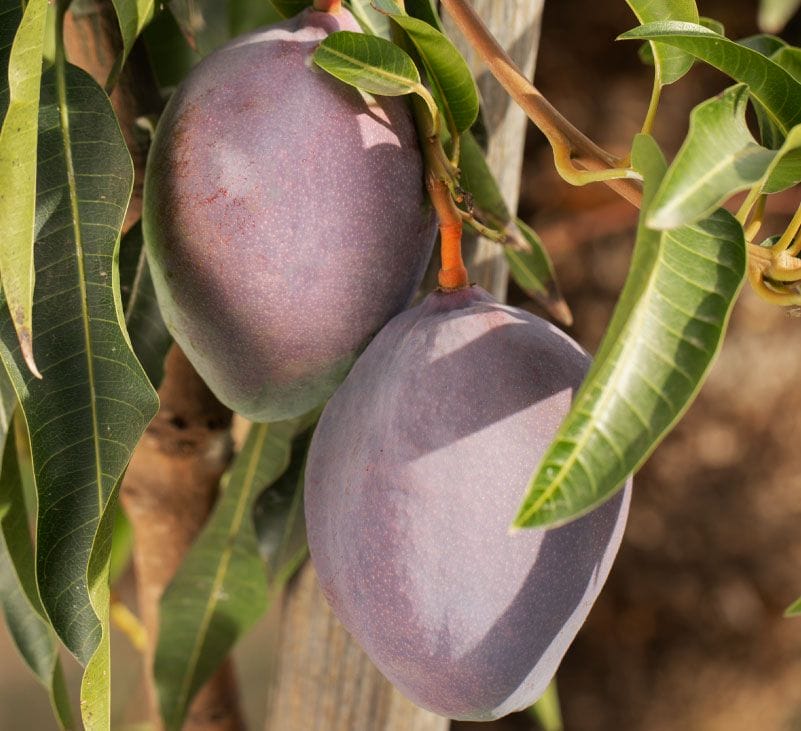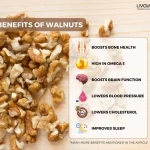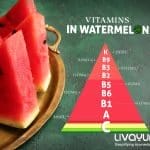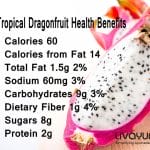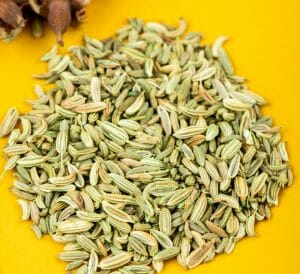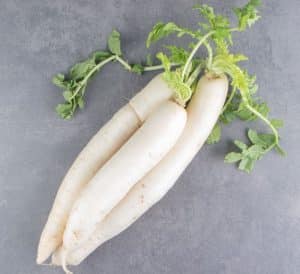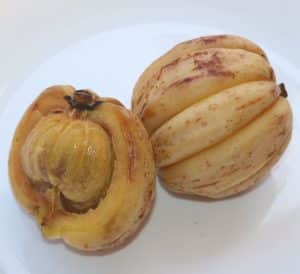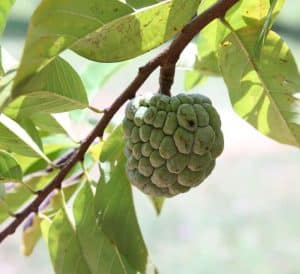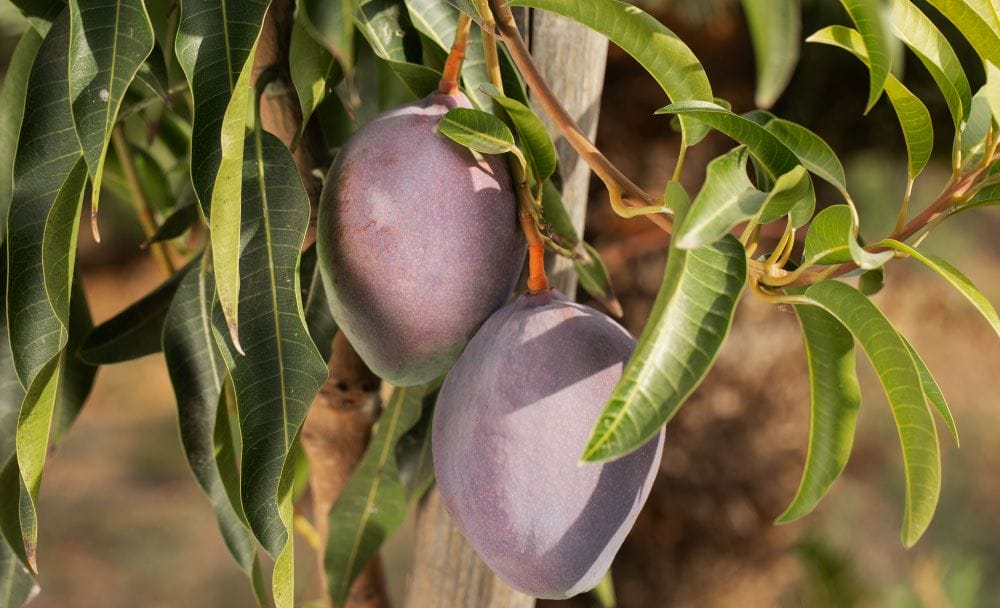
Mango fruit is a popular summer fruit, belonging to the category of stone fruits. A tropical tree with the scientific name Magnifera indica bears this delicious fruit. The mango fruit comes with an outer skin, a pulpy, edible portion and a stone-like seed at its core. [1] Mango trees in India date back to nearly 5000 years and the fruit has a cultural importance too. A basket full of this delicious fruit is looked upon as a symbol of love & friendship.
Mango, also known as ‘aam’ has been in use in the Ayurvedic medical systems for more than 4000 years. [2] The tree of mango is native to southern Asia. Mangoes vary immensely in character and size. The forms of mango fruit include fruits shaped like kidneys or heart or ones that are oval, slender and long or round in shape. Mangoes which are smallest in size are of the size of plums while some other varieties may weigh as much as 2.3 kg. [3] The mango fruit may range in color from reddish to yellowish or dull greenish. In this article, we’ll learn about the incredible health-boosting properties of mangoes such as anti-cancerous, anti-inflammatory and antioxidant properties. [4]
Mango Nutrition Facts
The mango nutrition facts will introduce you to the high nutritional value of this juicy, fleshy and delicious fruit. Mango fruit benefits are the result of the nutrients like vitamins and polyphenolics, [4] present in the fruit.
- Mango fruit vitamins include Vitamin A (10% of Daily Value for 165 grams of mango), Vitamin B6 (12% of Daily Value for 165 grams of mango), Vitamin C (67% of Daily Value for 165 grams of mango), Vitamin E (10% of Daily Value for 165 grams of mango) & Vitamin K (6% of Daily Value for 165 grams of mango).
- One cup (i.e. nearly 165 grams) of freshly sliced mango fruit comes with a calorie count of less than 100. Thus, mango calories consist of a low density of calories and are indeed a yummy, sweet treat that can suppress hunger if taken prior to meals.
- Sugar content of 22.5 grams in 165 grams of mango
- Protein content of 1.4 grams in 165 grams of mango
- Major minerals in Mango include copper (20% of Daily Value for 165 grams of mango), folate (18% of Daily Value for 165 grams of mango), potassium (6% of Daily Value for 165 grams of mango), and magnesium (4% of Daily Value for 165 grams of mango).
- Other nutrients that mangoes contain include Riboflavin, Niacin, and Thiamine.
Mango Types
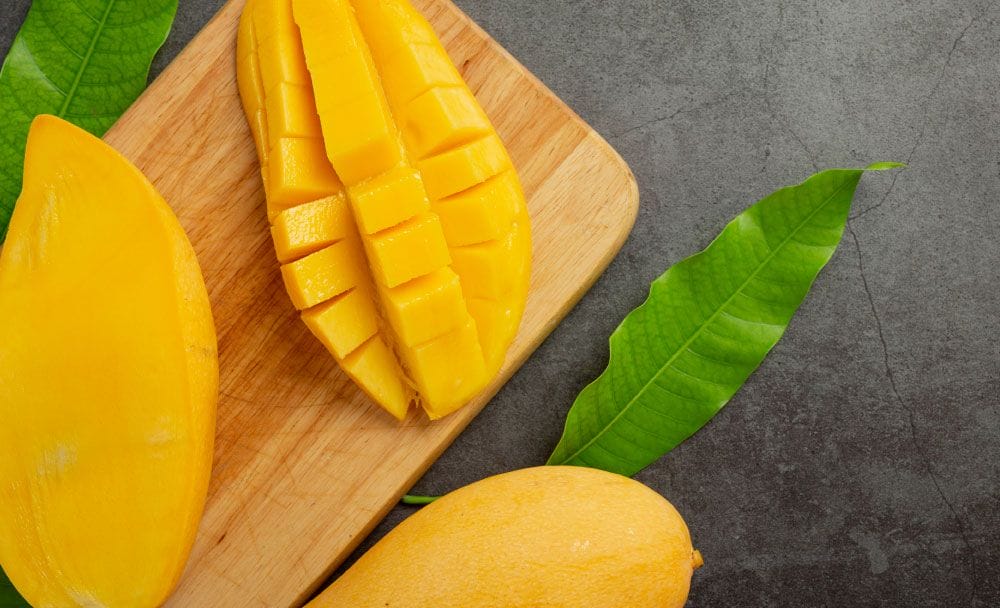
More than 1500 mango types are available in India. Some of the famous mango types are: Sindhura, Totapuri, Alphonso, Dasheri, Himsagar, Safeda, Chausa, Langra, Lakshmanbhog, Amrapali, Fazli.
Mango fruit benefit
1. Mango relieves constipation
The high fiber content of mangoes can be counted as one of the mango fruit benefits. Fiber helps to reverse constipation and get easy bowel movements.
2. Helps in digestion
Mango fruit helps to improve intestinal health by improving the quantity of gut microflora due to the presence of gallo-tannins in the fruit.[9]
3. Cancer-fighting properties
Mango fruit benefits include the fruit’s capacity to fight cancer. Polyphenols present in Mango have an anticancer effect.[7]
4. Reverses sun-induced skin damage
One of the notable mango benefits is the role played by the fruit in reversing sun damage and photo aging caused by the harmful Ultraviolet radiation of the sun. [6]
5. Good for your eyes
Zeaxanthin and lutein, antioxidants present in mangoes, can safeguard the retina of your eyes from damage caused by light. [8]
6. Supports health of the growing fetus
Consumption of mangoes can be helpful during pregnancy. Minerals, folate and copper present in mango can support healthy growth of the fetus. [5]
7. Helps in blood glucose management
Carotenoids, tocopherols, quercetin and other compounds present in mangoes can stabilize blood glucose levels especially in obese people.[10]
8. Prevents Infection
Vitamins A & C present in mangoes can increase the production of White Blood Cells thereby helping one fight infection. [11]
9. Delays aging
Essential vitamins and antioxidants present in mango can help in collagen production and slow down your biological clock.
10. Checks Inflammatory bowel disease
Mango has anti-inflammatory properties. Consumption of mangoes can check the symptoms associated with inflammatory bowel disease such as mucosal damage to the large intestines or ulcerative colitis. [12]
11. Promotes cardiovascular health
The anti-inflammatory properties in mangoes can have a cardio-protective impact.[13] Potassium and magnesium present in mango can improve blood flow to the arteries.
12. Expedites wound healing

Mangiferin and flavonoids present in mango and its peels can destroy bacteria thriving in the wounds. This leads to speedy wound healing. [14]
Side-effects of Mango fruit
Over consumption of mango may result in certain side-effects like:
- Throat ache, runny nose and sneezing [8]
- Stomach ache, indigestion and loose motion [8]
FAQs
1. Can I consume mango skin?
If you have allergic tendencies, it is better to avoid consuming the mango skin. The mango skin can produce allergic reactions like swollen lips and skin lesions.
2. How do I understand if the mango that I have chosen is ripe or not?
Don’t go by the color of the mango. Take the mango in your hand and squeeze gently. If the mango is ripe, you will see pulp or juice trickling out.
3. What is the smell of mango like?
A ripened mango has a sweet, delectable aroma. If the mango smells sour, fermented or unpleasant, it has reached its rotting stage.
Conclusion
Mango fruit, as discussed above, is a delicious and healthy gift from the womb of Mother Nature. One should include this fruit in his or her daily diet to reap its maximum benefits.
Disclaimer:
This article has been written solely to provide information and is not intended to diagnose or heal a disease. If you are looking for treatment, you must consult a doctor.
References:
- MANGO FACTS
- Mangifera Indica (Mango)
- Mango
- Multifaceted Health Benefits of Mangifera indica L. (Mango): The Inestimable Value of Orchards Recently Planted in Sicilian Rural Areas
- Maternal and Placental Zinc and Copper Status in Intra-Uterine Growth Restriction
- Protective effect of mango (Mangifera indica L.) against UVB-induced skin aging in hairless mice
- Polyphenols as Modulator of Oxidative Stress in Cancer Disease: New Therapeutic Strategies
- Mango (Aam): Uses, Benefits, Side Effects by Dr. Smita Barode
- Mango (Mangifera indica L.) Polyphenols: Anti-Inflammatory Intestinal Microbial Health Benefits, and Associated Mechanisms of Actions
- Mango Supplementation Improves Blood Glucose in Obese Individuals
- A Review of Micronutrients and the Immune System-Working in Harmony to Reduce the Risk of Infection
- Multifaceted Health Benefits of Mangifera indica L. (Mango): The Inestimable Value of Orchards Recently Planted in Sicilian Rural Areas
- Effects of fresh mango consumption on cardiometabolic risk factors in overweight and obese adults
- The Wound-Healing Effect of Mango Peel Extract on Incision Wounds in a Murine Model




